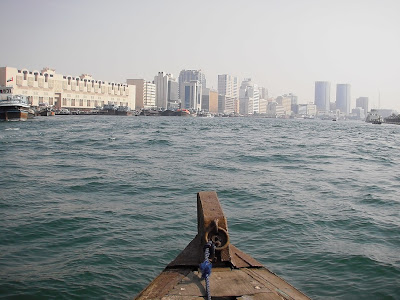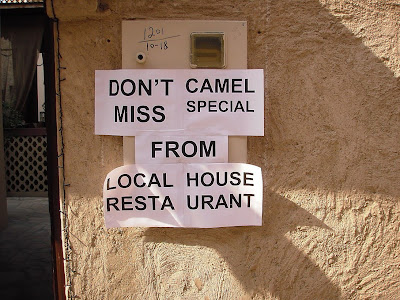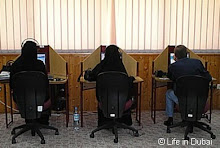On Thursday, the morning after Dubai World's bombshell announcement that payment of the Nakheel bond due on December 14 was to be delayed, I said it was "badly, badly handled all round".
An understatement.
It was actually a classic of mishandling. Business schools should use it as a case study of exactly what not to do. Of how to turn bad news into a disaster.
There's inevitably been over-reaction, with bond and stock markets plunging from Europe to Asia to the US to Australia, bank shares hammered, a flight to safe havens, damning stories all around the world.
"Nervous traders, trying to understand what it meant, caused havoc across global markets. Shares plunged, currencies were battered and billions of pounds were wiped off the value of all companies with Middle East connections. British banks, considered to be among the most exposed to Dubai, were at the centre of this new maelstrom and collectively shed £14bn in value on Thursday alone."Daily Telegraph
An overreaction of course but panic is the natural reaction of markets to bad news. After a short period it settles down as people think rather than just act but blind panic is always the first response.
To put it in perspective the amounts involved (about $60billion) are tiny in relation to what's been going on in the world. Companies like Lehman Bros ($613billion liabilities), banks by the dozen, countries like Iceland were leveraged multiple times more than DW, making Dubai World's debts almost petty cash.
But Dubai's reputation is taking a battering because of the way the thing was handled.
Statements in the months leading up to the maturing of Nakheel's bond were that the finances were all in order, then came the terse announcement on Wednesday that payment due on December 14 would be deferred at least six months. The timing of the announcement minutes before the ten day holiday added immeasurably to the problem, causing the doubts and panic, increasing the fallout. An obvious attempt to dodge the hard questions that were bound to be asked.
The problem isn't only the admission that the commitments couldn't be met - there's still belief that Abu Dhabi will come to the rescue. The way it's been handled leads people to believe that Dubai's much-vaunted business acumen is a myth. If they can't even handle something like this competently...
I've been glancing through some of my regular reads and I'm finding:
"Released after the markets shut, ahead of the 10-day Eid holiday and the Thanksgiving break in America, the notice was designed to have minimum impact. It wasn't the Dubai government's first miscalculation.amateurish...botched messaging...episode of incompetence...the biggest debt-market cock-up...this week's events have damaged its reputation for economic competence"The Nakheel bond has been the subject of much speculation for a year at least. It was the big test of Dubai's ability to service its debt, of Dubai's ability to run businesses effectively. In a wider sense it was also taken a representative of Islamic bonds in general.
Past months have seen senior government figures reassuring the markets. Dubai could and would meet its commitments they said.
Even earlier in the day of the announcement statements were released about Dubai raising another $5 billion from Abu Dhabi banks.
So everything was under control.
What happened?
They decided to make the announcement of what is being seen as a default at close of business.
At close of business on the eve of a ten day holiday.
Drop a bombshell as you leave for holiday.
"Dubai’s authorities have acted badly....This week’s revelations were not only unexpected; they were also delivered just as the Gulf states shut up shop for an extended holiday. This is the action of a company that seems to think that it can operate in a globalised marketplace only when it suits its purposes."The Times
I seems it's not only investors and traders who were caught by surprise. More than one report suggests that even Abu Dhabi wasn't aware that the announcement was going to be made.
"Thursday's market turmoil appeared to take federal officials in the capital Abu Dhabi by surprise. One person familiar with their thinking said there was dismay over the reaction to the handling of the announcement."Wall Street Journal
There are also reports that 'frantic phone calls' to government officials and business leaders were unanswered.
Naturally. Everyone's on holiday. Try again about December 6. No problem, that's not even two weeks away and everything's under control anyway.
It was carefully planned, according to the statement issued late on Thursday.
I like the column by Alistair Osborne in the Daily Telegraph on the subject:
"Why we must consider Dubai's 'careful planning' a work of pure genius
Let's be generous here. Maybe Dubai was just trying to set another record.
It's already given us the biggest building, biggest indoor ski slope, biggest shopping mall and biggest theme park. Surely, it was only a matter of time before it went for another biggie: the biggest debt-market cock-up.The Wall Street journal says:
"For Dubai to now claim it had anticipated the market reaction to its "sensible business decision" is preposterous. Dubai stands accused of irresponsibility, incompetence and bad faith. Few will trust now anything it says."So, a PR disaster of the highest magnitude. Unbelievably badly handled. I can't imagine what they were thinking, it shows a complete unawareness of the real business world.
It's astonishing from a city that owes its very existence to commerce. A city that's been a successful trading, commercial centre from its beginnings. Where business is the culture.
It really should, and probably will, be required study at business schools.
But it won't be the end of Dubai, in spite of what some commentators will now be saying. We've already seen some of that, plus highly critical pieces using the announcement as an excuse to come back into print, such as the latest Johann Hari piece in The Independent.
The sky won't fall in. The desert won't reclaim the city. It won't be a ghost town.
Think of it terms we've grown accustomed to over the past year. Think of it as toxic debt. It's separate from the real economy. It's like the financial markets and the real economy, they're very different from each other.
This is about the ability of one company in particular, and associated companies, to repay its loans.
Dubai has two sectors, the most important is the real economy where tens of thousands of generally SMEs are still trading, still doing profitable business. Dubai Chamber of Commerce has over 100,000 members for example, and Jebel Ali Free Zone alone has over 6,000 companies registered there.
Other large government-related companies such as Emirates Airline, Dubal, Ducab, Dubai International Airport, Dubai Duty Free are all producing excellent profits.
And of course the old established merchant family conglomerates are still going strong - Al Ghurair, Al Futtaim, Al Majid, Al Habtoor, Galadari and the others.
So business goes on much as usual in the real world. It's always been there, trundling along quietly and profitably out of the news. Dubai's history since the early eighteen-hundreds has been about being commercially successful and going on into the future that will continue.
The other sector is the fantasy world of unsustainable development. But that was a blip in the grand scheme of things for the last five or six years, for other parts of the world too, not just for Dubai - although Dubai's was more outrageous, more unsustainable than probably anywhere. That's what's dead, the fantasy world, the parallel universe, to which Nakheel was the worst contributor.
I said earlier that Dubai's culture was business, which is what I've long argued with people who've said there's no culture. People are here to work, to do business, and always have been. It's the focus of just about everyone here and it's the reason for the city's existence.
But another part of the culture is 'I must have it now' and that's been a large part of the problem. Wanting to build a city the size of Singapore in a decade.
What's actually been achieved is amazing but Nakheel in particular went far too far in too many grandiose developments at the same time. Reality went out of the window and they were off in the land of the fairies. Reality always reappears as it has now.
It's a pity the old established merchant families weren't in charge. In fact it seems with the recent sackings and sideways transfers of some big-name rising stars that the old guard is being brought in to get things back onto a more sensible level.
A huge PR disaster, damage to Dubai's reputation, damage that will take some time to repair, and a setback for Dubai's growth. But not its collapse.
You can read some of the international press I've quoted from here:
The Times.Daily Telegraph.Wall Street Journal.



































